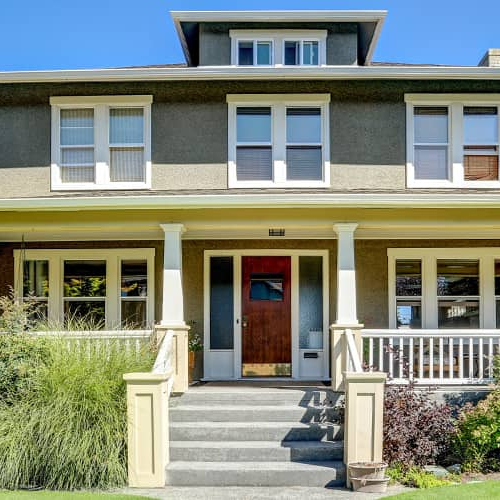What are lender credits used for when buying a house?
Contributed by Tom McLean
Nov 9, 2025
•6-minute read

If you’re struggling to come up with enough for closing costs on top of a down payment on a home, or you don’t want the up-front fees of buying a home to deplete your savings completely, consider asking for lender credits. Your lender will pay some or all of your closing costs in exchange for you paying a higher interest rate.
Is this the right choice for you? Read on to learn more about the pros and cons of lender credits.
What is a lender credit?
Closing costs are a significant expense when buying a home, usually second only to the down payment. Closing costs usually run from 3% – 6% of your loan amount. If you are borrowing $300,000, you can expect to pay $9,000 – $18,000 in closing costs.
Most borrowers pay closing costs in cash at closing. But if you can’t afford these fees or prefer to hang onto some of your money for other expenses, you can ask for lender credits.
Every lender credit reduces your closing costs and raises your interest rate. You avoid up-front fees but pay more overall interest.
How high your interest rate goes depends on how many credits you take. The more lender credits you take, the higher your interest rate and the more expensive your mortgage will be over time.
How do lender credits work?
One lender credit usually equals 1% of your loan amount. If you’re taking out a mortgage for $300,000, one lender credit would cover $3,000 in closing costs. Since closing costs run 3% – 6% of your loan amount, this would reduce but not completely cover the cost. You can take out multiple credits to cover more or all of your closing costs.
How much your lending institution increases your interest rate to pay for the credit varies. A typical amount is 0.25% per credit.
Increasing your interest rate will raise your monthly mortgage payment and cost you more in interest over the life of your loan.
Your lender credit or credits appear on your Loan Estimate, which your lender must provide within 3 days of receiving your loan application, and your Closing Disclosure, which is provided at least 3 days before closing. Lender credits may be listed as "negative points" or a "negative percentage."
How to negotiate lender credits
Not all mortgage lenders offer lender credits. If your lender does offer them, you can increase your chances of qualifying for the credits with the smallest increases in your interest rate if you have a strong credit score and a low debt-to-income ratio. A larger down payment also can help.
Lender credits vs. mortgage points
You can also pay for mortgage points when closing your mortgage loan. Mortgage points are the opposite of lender credits. Buying points when you close your mortgage reduces your mortgage rate.
Lenders usually charge 1% of the loan amount for one discount point. If you take out a loan of $350,000, a single point costing 1% would come out to $3,500.
Buying one point usually reduces your mortgage rate by 0.25%.
Benefits of lender credits
Lender credits can help make buying a home more affordable. Here are the most important benefits.
You pay less up front to your lender
The main benefit of lender credits is that you pay less in closing costs. Depending on how many credits you buy, you could eliminate your closing costs. Say your lender is charging you $9,000 in closing costs. If you accept $6,000 in credits from your lender, your closing costs are reduced to $3,000.
More money can go to your down payment
Less expensive closing costs may allow you to make a larger down payment. A larger down payment can qualify you for a lower interest rate and save you money on your monthly mortgage payment.
Lenders like it when borrowers make a larger financial commitment to their home. In their view, the larger your down payment, the less likely you are to stop making your payments because you’ve already invested so much. This makes you less of a risk, so lenders don’t have to charge as high an interest rate as a safety net.
You might be able to avoid private mortgage insurance (PMI)
If you take out a conventional mortgage and put down less than 20%, you’ll need to pay for private mortgage insurance. PMI reimburses your lender for its losses if you default on your mortgage. How much you pay for PMI varies, but Freddie Mac says that you can expect to pay from $30 to $70 a month for every $100,000 that you borrow. If you take out a $300,000 mortgage, you can expect to pay an extra $90 to $210 a month for PMI.
But if you buy lender credits and pay less in closing costs, you might have enough extra money to come up with a down payment of 20% of your home’s purchase price, avoiding PMI.
Drawbacks of lender credits
There also are drawbacks to lender credits. Here are two of the most important.
You could pay thousands more for your loan
Buying lender credits could mean that you’ll pay thousands of dollars more in interest. That’s because when you buy lender credits, your lender boosts your interest rate. The higher your interest rate, the higher your monthly payment and the more you’ll spend on your mortgage over time.
Lender credits could affect refinancing in the future
You might want to refinance your loan to one with a lower interest rate. If you use lender credits when taking out your loan, the cost of refinancing could be higher. Why? When you take out lender credits, you pay more in interest. Because of this, not as much of your monthly payment – especially early in your pay-off cycle – goes toward reducing your loan’s principal balance.
Because you’ll typically pay 3% to 6% of your loan’s remaining balance in closing costs when refinancing, you’ll pay more to refinance if you haven’t reduced your mortgage’s principal balance by as much.
Other ways to save on closing costs
There are ways to reduce your closing costs without lender credits.
- Seller concessions: With seller concessions, the seller agrees to cover some of the costs that buyers usually pay in a real estate sale. Why would sellers do this? They might agree to concessions to make their homes more attractive to buyers, especially if they want a quick sale. Usually, sellers agree to provide a percentage of the home’s sales price as concessions. Say you are paying $300,000 for a home, and the sellers agree to concessions equal to 3% of that price. You’ll receive $9,000 at closing to pay for closing costs.
- Negotiate a lower sales price: You might be able to negotiate a lower sales price on your home. If you do, you won’t need to take out as large a mortgage. Because closing costs are a percentage of your mortgage amount, these fees will be lower if you take out a smaller home loan.
- Roll your closing costs into your mortgage: If you don’t want to pay your closing costs upfront, you might be able to add them to your loan balance. Say you are taking out a $350,000 mortgage, and your closing costs are $12,000. If you roll your closing costs into your loan, you’ll now pay back a mortgage of $362,000. There is a drawback to this: You’ll pay more in interest over the life of your loan because your balance is higher. Your monthly payment will be slightly higher, too. Be aware that your lender might not allow this.
FAQ
Questions about lender credits? Here are answers to some of the more common ones.
Is taking lender credits a good idea?
That depends on your financial situation. If you don’t have a lot of cash saved and you don’t want to drain your bank account, lender credits could help you buy a home for less up-front money. On the negative side, your mortgage will now have a higher interest rate, which means you’ll pay more each month and over the life of your loan.
Can you negotiate lender credits?
Maybe. You might be able to negotiate with your lender on how much your mortgage interest rate will increase if you accept a lender credit. Your lender, though, is under no obligation to negotiate this figure, and many won’t.
Can lender credits exceed closing costs?
No. The total credits that you receive when closing your mortgage can’t exceed the amount of your closing costs. This means that you can’t receive extra lender credits that you could then apply to your mortgage’s down payment.
What is the maximum lender credit on a conventional loan?
The maximum amount you can receive in lender credits for a conventional mortgage depends on your mortgage's loan-to-value ratio. Fannie Mae says that if your LTV ratio is greater than 90%, you can receive total financing concessions of up to 3% of your mortgage amount if you are buying a principal residence or second home. That amount increases to 6% if your LTV ratio is 75% to 90% and 9% if it is 75% or less.
The bottom line: Lender credits can help you save on closing costs
If you want to reduce your closing costs, lender credits are an option to consider. But remember that lender credits are paid for with a higher mortgage rate. You’ll need to decide if it’s more important to pay less at closing or pay thousands of dollars more in interest over the life of your mortgage.
Are you ready to make the move to homeownership? Start your loan application today with Rocket Mortgage®.

Dan Rafter
Dan Rafter has been writing about personal finance for more than 15 years. He's written for publications ranging from the Chicago Tribune and Washington Post to Wise Bread, RocketMortgage.com and RocketHQ.com.
Related resources

5-minute read
How much money do you need to buy a house?
Ready to buy a home? Explore different home buying costs, such as the down payment and closing fees, to determine how much money you need to buy a house.
Read more
7-minute read
What is cash to close?
In order to close on your house, you will need to bring cash to close the mortgage deal. Learn what expenses are included in your cash-to-close amount and mo...
Read more

10-minute read
How much house can you afford?
Ever asked, “How much house can I afford?” Determine how much you can spend on a mortgage with help from the Rocket Mortgage home affordability calc...
Read more